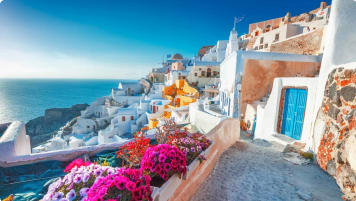Questions about Greece: The Definitive Guide for Seniors
Explore and learn about on a Seniors small group tour to Greece and its islands. A place of pastoral, cultural and historic settlement. Visit Epidaurus, Rhodes and the Greek islands or take a walking tour.
1 Jul 19 · 2 mins read
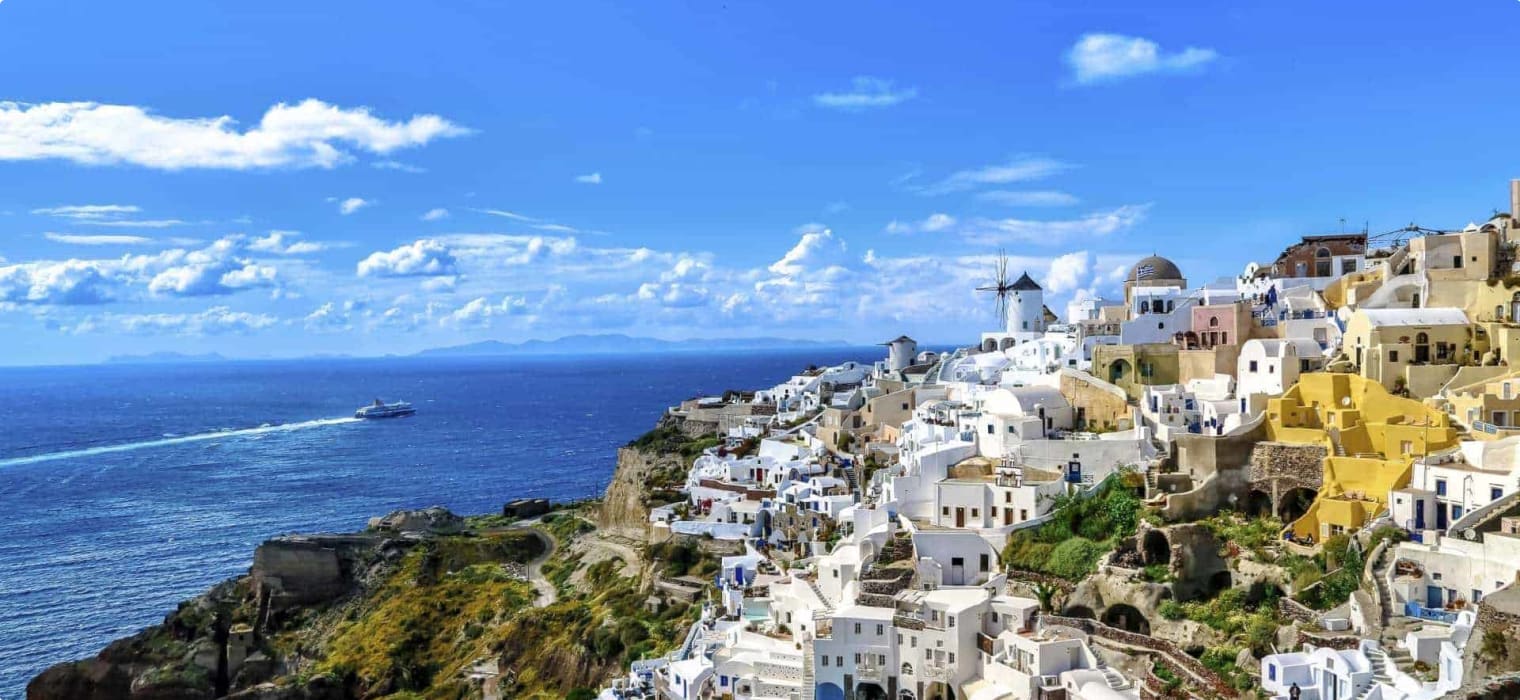
FAQs
Where is Greece on the map?
Greece (Greek: Ελλάς, Hellas) is located in sun-drenched southern Europe, on the southernmost tip of the Balkan peninsula. It has extensive coastlines and hundreds of inhabited islands in the Aegean, Ionian, and Mediterranean Seas. Greece shares borders in the north with Albania, the Republic of Macedonia, Bulgaria, and Turkey.
What is Greece famous for?
Greece is famous for giving birth to democracy, for its ancient culture that has had a significant influence on the world, and for its mountainous mainland and idyllic island beaches.
Athens is the capital and largest city of the modern-day Greek Republic, but thousands of years ago, when Hellas was not a single unified nation, Athens was one of its most important self-governing city-states (poleis; singular form: polis). The cradle of democracy, birthplace of prominent philosophers such as Socrates and Plato, home of the “father of history” Herodotus, the Acropolis, and Aristotle’s Lyceum, and the city that nurtured the tragedian Sophocles and the comedian Aristophanes, Athens was the centre of Greek civilised life and the wellspring of the artistic, philosophical, and intellectual ideas that still guide us to this day.
Why is Greece called Hellas?
Hellas is the name used in ancient Greece, and the name modern Greeks use to refer to their country. The country’s official name is the Hellenic Republic (Helliniki Dimokratia) and it is referred to as Hellas in the European Union. “Greece” was adopted into English from the Latin name Graecia, which was what the Romans used to refer to Hellas. Graecia simply translates to “land of the Greeks”.
There are several theories regarding the etymologies of Hellas and Graecia, with roots in ancient mythology. One theory says Hellas came from Hellen, son of Deucalion and Pyrrha, who survived the Great Flood; and that Graecia came from Graecus, son of Zeus and Pandora, who is the sister of Hellen. However, the source of the terms remain uncertain and no theory is widely accepted
Which visa do you need to visit Greece?
Greece has been a Member-State of the European Union since 2000 and has signed the Schengen Agreement, which means you only need the Greek Schengen Visa for a short stay visit of up to 90 days or three (3) months. Exemptions apply (for example, citizens of Australia and the United States can visit Greece visa-free) so it is always a good idea to check with your local consulate before travelling.
The Schengen Visa also allows you to visit other countries included in the Schengen Area, which as of 2019 consists of 26 countries. Citizens of the Schengen Area countries only need an Identity Card to visit Greece, but may need to show a passport upon arrival for security checks.
Where do you fly into to visit Greece?
A popular point of entry into Greece is through the Athens International Airport, located 33 kilometres southeast of Athens and connected to the city via an underground railway and bus routes.
It is a modern airport which began operating in 2001, replacing an old airport (now closed), and is currently among Europe’s busiest air transport hubs.
The airport is named after Greek statesman Eleftherios Venizelos, who established Greece’s first Ministry of Aviation. A permanent exhibition dedicated to him is housed in the airport, along with permanent exhibitions of archaeological findings and pieces from the Acropolis Museum–a great start to your Greek holiday.
When is the best time to visit Greece?
The best time to visit Greece is April to June, if you wish to avoid the swell of tourists during the summer peak season and still enjoy some sunshine. Greece has a Mediterranean climate, which means mild temperatures and limited rainfall, which can make even the winter months a viable time to visit.
The vast majority of visitors arrive during the summer months of June to August. The average summer temperature in Athens is around 30 degrees Celsius. April has an average high of 20 degrees, and progressively grows warmer as we approach the summer months. Temperatures begin to drop in November, with an average max temperature of 18 degrees.
Where in Greece can you go on holiday?
Most of the tourists and tourism industry in Greece are concentrated in the capital, Athens, and the islands of Crete, the Dodecanese, Cyclades, and the Ionian (Western Greek) Islands.
Athens is a popular entry point and a worthy city break, especially for those interested in ancient history, but there is plenty more to explore in the archipelago. Greece is composed of 6,000 islands and islets with coastlines on the Aegean and Ionian seas, with less than 300 of them inhabited.
After enjoying a view of the Agora and the Acropolis in Athens, you may want to head to Crete, the largest island in Greece. Learn more about the ancient Cretans that archaeologists now refer to as the “Minoans”, after the labyrinthine nature of a Bronze Age archaeological site unearthed in Crete, and which was probably the origin of the ancient tale of King Minos and the Minotaur. The Minoans had an advanced culture, the first of its kind in Europe, and you can see it in the incredible details of the Knossos Minoan Palace. You can also take in the natural beauty of the gorgeous beach of Elafonissi.
Speaking of gorgeous beaches, sandy coastlines and crystal-clear waters define the group of 56 islands called the Cyclades (“circular islands”), located about 200 km (or 120 miles) from the Greek mainland. They form a circle around the sacred island of Delos, the ancient headquarters of the Delian League formed by Athens to ward off attacks from Persia. Santorini is its most well-known, itself a group of islands: the large inhabited island of Santorini (with the Minoan town of Akrotiri on the southern tip) and a smaller inhabited island called Therasia, and the uninhabited islands of Nea Kameni, Palaia Kameni, Aspronisi, and Christiana.
You can go island hopping through the lush Ionian Islands, or decide to stay in cosmopolitan Mandraki or the quieter Lindos on the island of Rhodes in the Dodecanese.
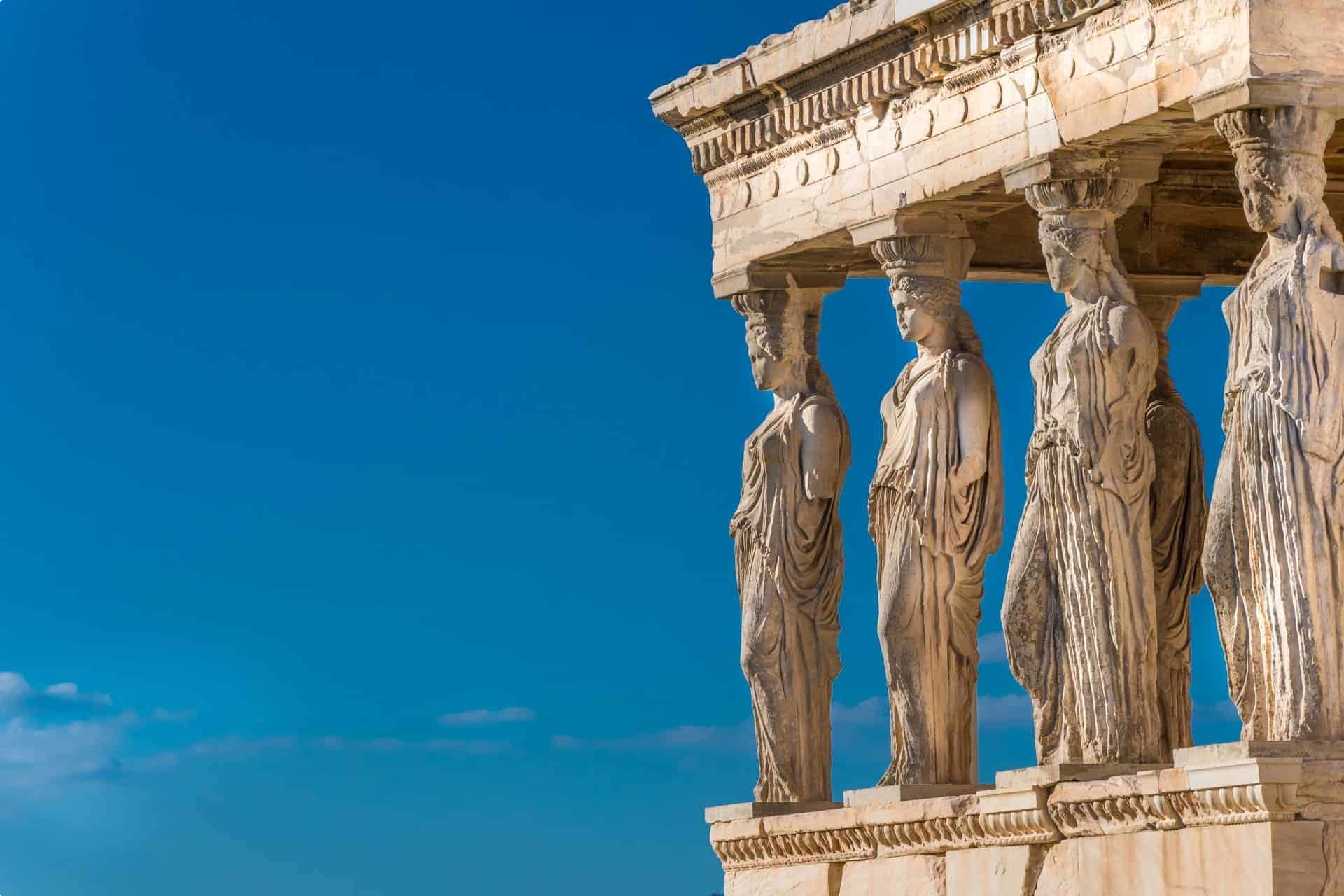
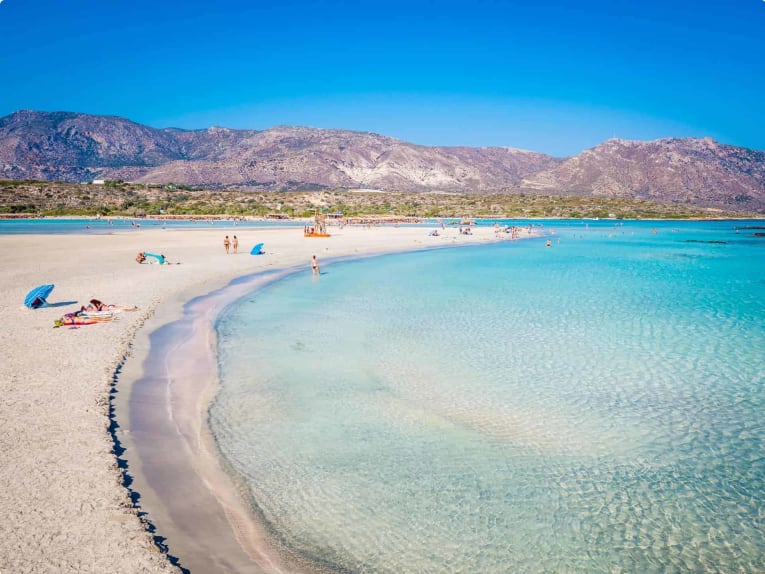
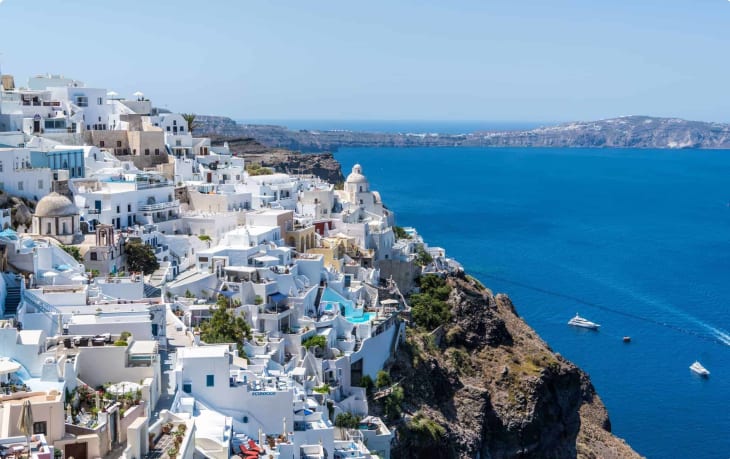
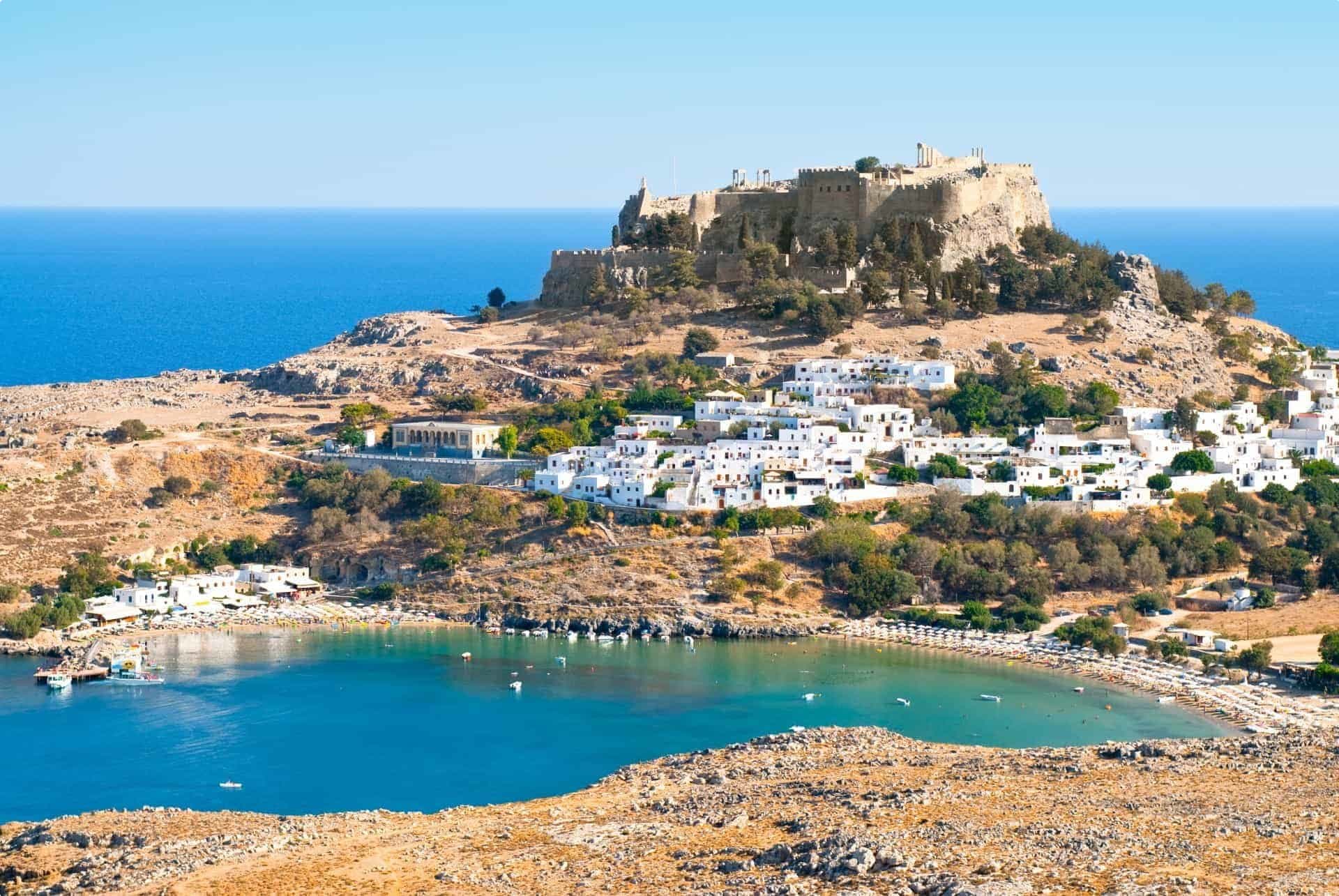
Where can you stay in Greece?
As Greece has a strong tourism structure in place, you can choose from a wide array of accommodations: hotels, restored cottages, traditional villas, beach campsites, and even a secluded eco-resort built in the Greek highlands!
Can you travel around Greece without a car?
You can definitely travel around Greece without a car because Greece has a reliable (and cheap) public transport service.
As of 2019, Athens is the only city in Greece with a subway system. The Thessaloniki subway system is still being constructed, with operations eyed to start in 2020.
Greek towns also have an extensive bus network, but you will only really need them in Athens, Patra, Kalamata and Thessaloniki as other towns are small enough to explore by walking.
Taxis are also an option, but rates double from midnight until 5 am. Consider downloading Beat (formerly Taxibeat), an app you can use to hail a taxi. You can pay in cash, by card, or through Paypal.
Of course, if travelling between the Greek islands, you can hop on a ferry or the faster but more expensive hydrofoil service.
What can you buy in Greece?
Every major tourist hub has an assortment of souvenirs you can bring home as memorabilia, and in Greece they range from the practical to the mythical.
You can buy olives and authentic Greek extra virgin olive oil. The Greeks have been cultivating olives since ancient times, and to this day Greek olive oil is renowned for its quality.
Another famous Greek product is honey, which is said to be richer and denser compared to honey produced in other countries. Wild thyme honey, light in colour and produced by bees feeding on the nectar of wild thyme flowers, is rarer and therefore more expensive.
You can also buy handmade leather sandals and painted ceramic, as well as amber kompoloi (worry beads), used as a stress reliever in Greek culture, and the mati (eye), a blue charm to protect you from the “evil eye”.


If you want to learn more about Athens and the ancient Greeks, do join Odyssey Traveller’s small group tours, designed for the mature-age traveller who wants to go on an adventure alone or with a partner.
- The tour to Greece begins and ends in Athens and visits the Greek islands of Corfu, Mykonos, and Delos as well as the ancient cities of Corinth, Delphi, and Olympia.
- The Eastern Mediterranean Islands small group tour covers Athens, Santorini, Cyprus, and Crete
- You can also read our articles on Santorini and Athens.
Related Tours
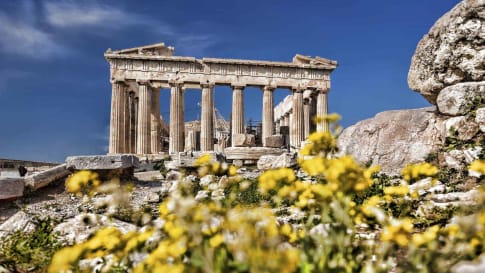
22 days
Apr, Sep, MayGreece small group escorted history tour
Visiting Greece
Our 22 day small group tour explores the land of great philosophers, myths, and legends. We will learn about the culture and heritage of modern Greece whilst exploring and learning Athens, which only found independence in its uprising from the Ottoman Empire in the 19th century.
From A$14,145 AUD
View Tour
20 days
Sep, AprCrete Small Group Tour: The Minoans
Visiting Greece
Crete rich in UNESCO World heritage sites this small group escorted tour provides a travel experience for guests with experienced local guides to remember. For senior couples or single travellers who seek to travel with other like minded people to destinations rich in ancient history then this in one of many small group journeys to be enjoyed.
From A$13,500 AUD
View Tour
21 days
Apr, OctSantorini, Crete and Cyprus Small Group Tour | Eastern Mediterranean Islands Tour
Visiting Cyprus, Greece
A fascinating small group tour, with an amazing mix of culture and history – the islands of Greece, the cradle of Western civilisation, where traces of a centuries-old history exists. Visit Santorini, a remnant of a volcanic era; Crete, the home of the Minoan civilisation with important archaeological finds at Knossos and Phaistos. Rhodes, inhabited since the Stone Age; and venture further to the island of Cyprus, where east meets west.
From A$17,545 AUD
View Tour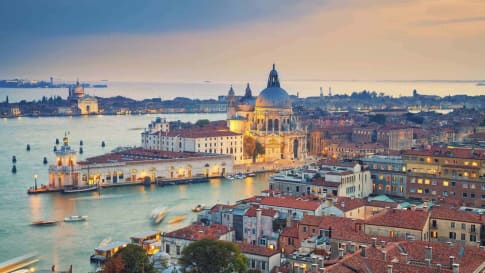
27 days
DecEuropean Cities Small Group History and Cultural Winter Tour
Visiting Albania, Croatia
An escorted tour A Journey that commences in Rome and takes in 12 destinations along its journey to Athens. This is an off season small group journey with like minded people. A small group tour across Southern Europe with local guides sharing authentic in-country authentic experiences for mature couples and solo travellers.
From A$17,295 AUD
View Tour
10 days
Apr, Oct, MarSantorini - Crete: Eastern-Mediterranean Islands Short tour
Visiting Greece
Join our small group short tour of the Eastern Mediterranean. Spend 10 days in Greece for a glimpse of the land of great philosophers, myths, and legends. We will learn about the culture and heritage of modern Greece while travelling from Athens to Santorini and over to Crete.
From A$9,375 AUD
View TourArticles
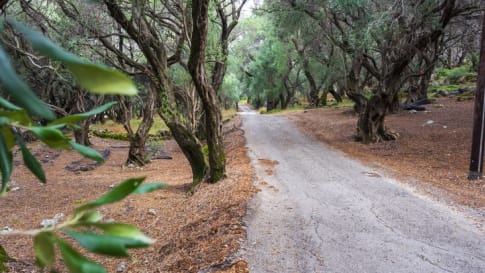
Corfu, Greece
Corfu differs to much of the rest of Greece, with notable limited archaeological sites but an abundant mixture of forts, medieval castles, palaces, Greek orthodox churches, and monuments.
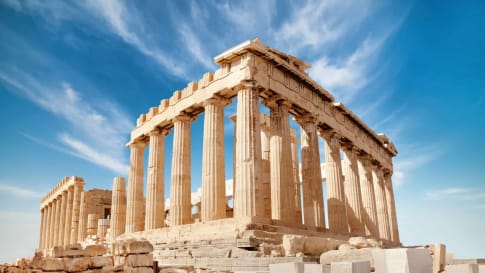
Creating Athens
Creating Athens Aerial view of Athens, Greece This article Creating Athens traces the civilisations of antiquity to the rise of Athens as a city-state after the world’s first “Dark Age”. It is intended as background…
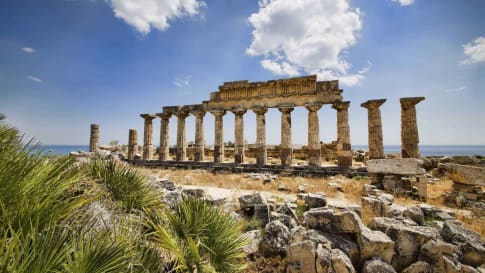
Dawn of Greek Civilization: The Definitive Guide for Travellers
The Beginning of Human Civilisation Ancient Greece stands out as a pivotal civilization that significantly influenced human progress. The period between 800 B.C. and 500 B.C., considered Ancient Greece, marked a flourishing era in various…
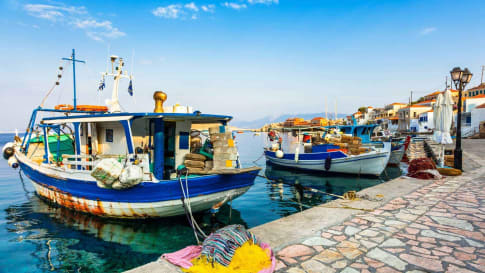
Empires Crossing the Mediterranean: 1130-1300
As a sea connecting continents and stretching from the Atlantic Ocean in the west to Asia in the east, the Mediterranean has for centuries been a centre of trade and exploration.
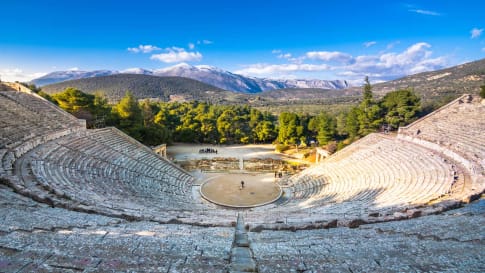
Epidaurus, Greece
Epidaurus was a small city in Ancient Greece on the eastern coast of the Argolid Peninsular at the Saronic Gulf

Greek Islands and Cyprus: Discovering the East Mediterranean
The Greek Islands and Cyprus are teeming with opportunities to visit archaeological sites and historic locations, while getting to know the region’s marvellous contemporary culture. Following the financial crisis, Greece […]

